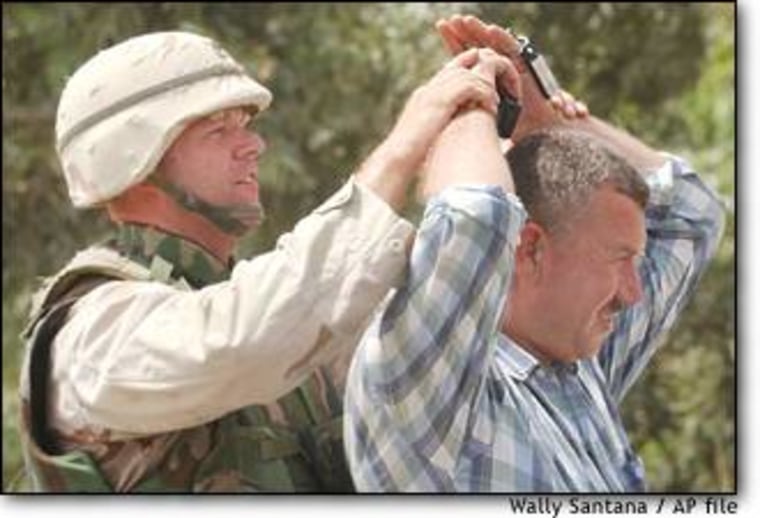Army units struggling with snipers and ambushes in Iraq and Marines poised to land in war-torn Liberia now carry with them a powerful weapon never before used on the battlefield: tiny field test kits known as “RIFFs” that enable a soldier to determine quickly whether someone has fired a gun in the previous 24 to 48 hours. While the RIFFs may not generate the “shock and awe” of other new weapons — the Air Force’s 9.5-ton “MOAB” bomb, for instance — officers involved in planning both missions say the shooter ID kits may be a lot more useful.
DEVELOPED FOR U.S. police agencies by Sandia National Laboratories and a Colorado Springs, Colo., company, Law Enforcement Technologies Inc., the RIFF kits use a chemical detection technique to identify gunpowder residue at a crime scene. Whenever someone fires a weapon, such residue clings to the shooter’s clothing, hands, arms and face.
Col. Andy Gembara, a retired Army special operations forces leader, says the Marine Corps and Army both have purchased thousands of cases of the kits in the past few months in hope of providing troops who find themselves forced into detective work a technological advantage.
“The Army wanted something small and idiot-proof,” says Gembara, a board member of Law Enforcement Technologies. “It is meant to be provided to patrols and to MPs (military police) so they can help sort out the good guys from the bad guys.”
THE ‘P’ WORDS
The U.S. military famously prefers not to get involved in peacekeeping missions or police actions. Indeed, on Tuesday, the Pentagon confirmed reports that it plans to shut down the Peacekeeping Institute at the Army’s War College in Carlisle, Pa., in two months. Like it or not, occupying a major Middle Eastern country has entailed many “Operations Other Than War,” as they are known in Army parlance. Whether the military calls it peacekeeping or not, the purchase of the RIFF kits is evidence that keeping the peace, even if it is in the Wyatt Earp sense of the term, is something both the Army and Marines find themselves doing.
Gembara says the RIFF kits will fit in a soldier’s pocket and will allow troops “to quickly identify the potential shooter near or on the crime scene.”
NEW SPEED
Previously, samples for such testing had to be sent to forensic labs, which used scanning electron microscopes to identify the residue, an expensive process that often took weeks.
The RIFF tests work a lot like home pregnancy tests, according to Sandia. A soldier swabs the suspected clothing or skin with a liquid chemical. If the swab turns blue, there’s a gun in the oven.
In domestic police work, the kits proved themselves quickly after their introduction in 2002. Already police agencies say a half dozen murders and murder-suicide cases were solved with help from the civilian version of RIFFS — known as “Instant Shooter ID Kits.”
In one case, for instance, in Glendale, Ariz., police intervened in a standoff between suspected gang members in a park and found an automatic weapon hidden nearby. All the suspects denied any knowledge of the weapon, but after police swabbed all of them with the kits, one man tested positive for gunpowder residue. He later confessed and was imprisoned for violating his parole.
In Iraq or Liberia or Afghanistan, where ambush attackers often seek to blend casually into crowds of innocent civilians, the utility of such a test is obvious. U.S. troops who sweep areas after such attacks now generally detain large numbers of people, invariably including many with no connection to the attack but who may be permanently alienated by their detention.
“We have no feedback yet,” says Gembara, “but I know MPs in Iraq already are using them. I can’t wait to hear the results.”
Michael Moran is senior correspondent for MSNBC.com.
